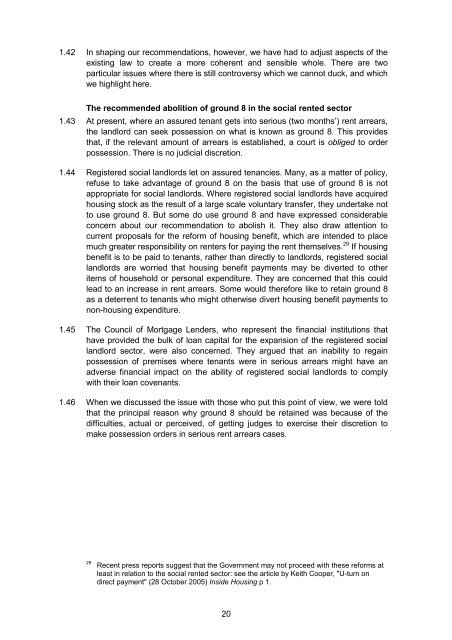Renting Homes: The Final Report - Law Commission
Renting Homes: The Final Report - Law Commission
Renting Homes: The Final Report - Law Commission
Create successful ePaper yourself
Turn your PDF publications into a flip-book with our unique Google optimized e-Paper software.
1.42 In shaping our recommendations, however, we have had to adjust aspects of the<br />
existing law to create a more coherent and sensible whole. <strong>The</strong>re are two<br />
particular issues where there is still controversy which we cannot duck, and which<br />
we highlight here.<br />
<strong>The</strong> recommended abolition of ground 8 in the social rented sector<br />
1.43 At present, where an assured tenant gets into serious (two months’) rent arrears,<br />
the landlord can seek possession on what is known as ground 8. This provides<br />
that, if the relevant amount of arrears is established, a court is obliged to order<br />
possession. <strong>The</strong>re is no judicial discretion.<br />
1.44 Registered social landlords let on assured tenancies. Many, as a matter of policy,<br />
refuse to take advantage of ground 8 on the basis that use of ground 8 is not<br />
appropriate for social landlords. Where registered social landlords have acquired<br />
housing stock as the result of a large scale voluntary transfer, they undertake not<br />
to use ground 8. But some do use ground 8 and have expressed considerable<br />
concern about our recommendation to abolish it. <strong>The</strong>y also draw attention to<br />
current proposals for the reform of housing benefit, which are intended to place<br />
much greater responsibility on renters for paying the rent themselves. 29 If housing<br />
benefit is to be paid to tenants, rather than directly to landlords, registered social<br />
landlords are worried that housing benefit payments may be diverted to other<br />
items of household or personal expenditure. <strong>The</strong>y are concerned that this could<br />
lead to an increase in rent arrears. Some would therefore like to retain ground 8<br />
as a deterrent to tenants who might otherwise divert housing benefit payments to<br />
non-housing expenditure.<br />
1.45 <strong>The</strong> Council of Mortgage Lenders, who represent the financial institutions that<br />
have provided the bulk of loan capital for the expansion of the registered social<br />
landlord sector, were also concerned. <strong>The</strong>y argued that an inability to regain<br />
possession of premises where tenants were in serious arrears might have an<br />
adverse financial impact on the ability of registered social landlords to comply<br />
with their loan covenants.<br />
1.46 When we discussed the issue with those who put this point of view, we were told<br />
that the principal reason why ground 8 should be retained was because of the<br />
difficulties, actual or perceived, of getting judges to exercise their discretion to<br />
make possession orders in serious rent arrears cases.<br />
29 Recent press reports suggest that the Government may not proceed with these reforms at<br />
least in relation to the social rented sector: see the article by Keith Cooper, "U-turn on<br />
direct payment" (28 October 2005) Inside Housing p 1.<br />
20

















